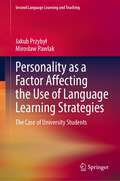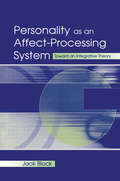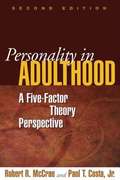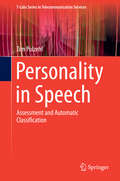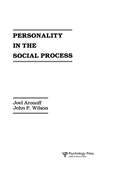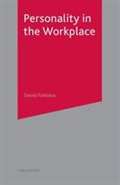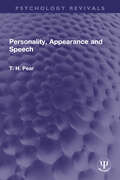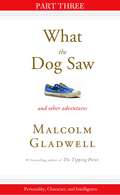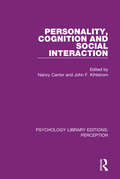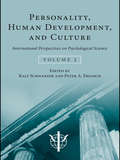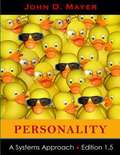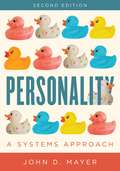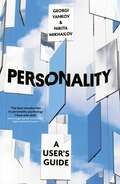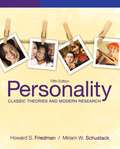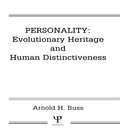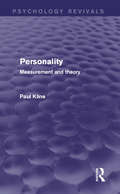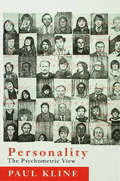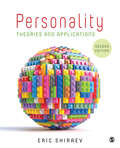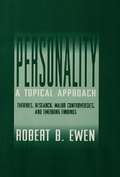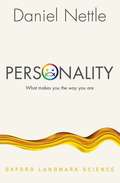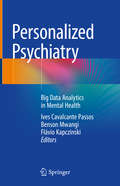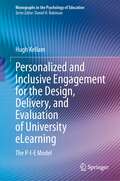- Table View
- List View
Personality as a Factor Affecting the Use of Language Learning Strategies: The Case of University Students (Second Language Learning and Teaching)
by Mirosław Pawlak Jakub PrzybyłThe book explores the relationships between the personality traits of Polish university students learning English as a foreign language and their use of language learning strategies (LLS). It provides a solid theoretical background for the investigation of the interface between the two constructs, describes the applied analytical procedures in detail, and reports the results and implications of a large-scale study. Chapter 1 presents multiple perspectives on the investigation of human personality and presents insights from a selection of studies into the role of personality in foreign language learning. Chapter 2 addresses the construct of LLS, while Chapter 3 links strategy use to other individual learner characteristics, with a focus on personality. Chapter 4 sets the methodological framework for the empirical investigation, describes the rationale for conducting the study, and includes a thorough description of analytical procedures. Chapter 5 presents the results of the study and highlights their pedagogical implications. Finally, limitations of the study are presented and some directions for future research are suggested. The monograph will be of interest to scholars investigating the role of personality in SLA as well as graduate and postgraduate students in applied linguistics.
Personality as an Affect-processing System: Toward An Integrative Theory
by Jack BlockAt least since Hippocrates, human beings have been trying to describe and analyze the behavioral and cognitive consistencies now referred to as personality. And in recent decades, no less than in the preceding centuries, they have generated a bewildering variety of construals and constructs. In this landmark book, Jack Block, who has spent more than 50 years studying the many facets of personality, takes a long look at current debates and finds common ground on which to construct an integrative model. Perceiving more congruence among disparate formulations than has hitherto been appreciated, he elaborates his vision of personality as an adaptive system that enables the individual to maintain equilibrium in an environment that is both threatening and engaging. Taking in and organizing information and maintaining nondisruptive levels of anxiety while responding to outer and inner demands are the tasks of this system, which consists of a perceptual apparatus and a control apparatus operating in delicate balance. After presenting his model of personality, Block discusses its intellectual history and its connections to major current alternatives. He lays out some implications for practitioners confronted by dysfunction. Finally, he traces the developmental origins of personality. Provocative, innovative, and analytical, Personality as an Affect-Processing System: Toward an Integrative Theory points to new directions for all those who seek to understand human psychological functioning.
Personality in Adulthood, Second Edition
by Robert T. Costa Jr. Robert R. MccraeThis influential work examines how enduring dispositions or traits affect the process of aging and shape each individual's life course. From two well-known authorities in the field, the volume is grounded in a growing body of empirical evidence. Critically reviewing different theories of personality and adult development, the authors explain the logic behind the scientific assessment of personality, present a comprehensive model of trait structure, and examine patterns of trait stability and change after age 30, incorporating data from ongoing cross-sectional and longitudinal studies. Written in a clear, jargon-free style, this book is an ideal text for advanced students and a timely reference for researchers and clinicians.
Personality in Speech
by Tim PolzehlThis work combines interdisciplinary knowledge and experience from research fields of psychology, linguistics, audio-processing, machine learning, and computer science. The work systematically explores a novel research topic devoted to automated modeling of personality expression from speech. For this aim, it introduces a novel personality assessment questionnaire and presents the results of extensive labeling sessions to annotate the speech data with personality assessments. It provides estimates of the Big 5 personality traits, i. e. openness, conscientiousness, extroversion, agreeableness, and neuroticism. Based on a database built on the questionnaire, the book presents models to tell apart different personality types or classes from speech automatically.
Personality in the Social Process
by J. P. Wilson J. AronoffFirst published in 1985. This book presents a new way to ask an old question. Many fields have considered the nature of the influence that members of a group exert on the course of social events. Social science provides another way to examine this issue. Moreover, social science has a particular strength: It helps us to phrase questions more precisely than before, it encourages us to follow a line of reasoning systematically, and it requires us to evaluate our ideas in light of a particular kind of evidence. The authors want to use these strengths to explore systematically the ways that factors in the person and in the environment together may shape the emergence of social behavior.
Personality in the Workplace
by David FontanaPersonality influences every aspect of our behaviour. Nowhere is this more true than in the workplace. From childhood to retirement, personality helps determine how we relate to others, how we approach our work, the level of our motivation, our ambitions and life goals, and our response to rules and regulations. Effective management, effective teaching, effective leadership all depend crucially upon our understanding of personality in others and in ourselves. Personality in the Workplace covers all aspects of personality assessment, personality development, and personality growth and change in a wide range of working environments, from the classroom to the office. Drawing upon extensive research findings and the author's personal experience as a leading psychologist, it discusses the major psychological theories of personality and goes on to examine how to get the best out of people, how to respond to their individual differences, how to understand the ways in which groups influence their members, how to recognise and respond to anxiety and to other inhibiting factors in people, and how to recognise serious personality problems. With its practical approach and easy jargon-free style, the book will be immediately accessible to students of organisational psychology and education, and will prove of great help to educators, to business people, to professional men and women, and to all those who have responsibility for the performance and wellbeing of others. David Fontana is currently Visiting Professor at the University of Algarve, Portugal, Distinguished Visiting Fellow at Cardiff University and Visiting Professor at Liverpool John Moores University. He is an educational and counselling psychologist with an extensive knowledge of personality in educational and occupational contexts. Among his many books, which together have been translated into 25 languages, are Managing Stress, Managing Time, Social Skills at Work, Psychology for Teachers and Managing Classroom Behaviour.
Personality, Appearance and Speech (Routledge Revivals)
by T. H. PearFirst published in 1957, Personality. Appearance and Speech is an intensive analysis of personality reflected by appearance and speech. It is a most fascinating study of the innumerable outward signs by which the man in the street judges personality. The author considers the effects this has on daily life; for example, can a person’s real character be assessed by a short interview in which personality, counting for so much, can be altered deliberately to no little extent? He describes many investigations which have attempted to discover experimentally the nature and accuracy of personality and character assessments, and includes personality sketches of F. D. Roosevelt, W. E. Gladstone, and of other prominent figures. He discusses the social results of the microphone and the effect on good and bad taste, of opinions widely expressed by listeners and viewers. The nature and function of the intellectuals who have increasing opportunities of affecting appearance and speech, are examined from the psychologist’s standpoint. This book will be of interest to students of psychology, sociology and social behaviour.
Personality, Character, and Intelligence: Part Three from What the Dog Saw
by Malcolm GladwellWhat is the difference between choking and panicking? Why are there dozens of varieties of mustard-but only one variety of ketchup? What do football players teach us about how to hire teachers? What does hair dye tell us about the history of the 20 th century? In the past decade, Malcolm Gladwell has written three books that have radically changed how we understand our world and ourselves:The Tipping Point;Blink; andOutliers.Now, inWhat the Dog Saw, he brings together, for the first time, the best of his writing fromTheNew Yorkerover the same period. Here is the bittersweet tale of the inventor of the birth control pill, and the dazzling inventions of the pasta sauce pioneer Howard Moscowitz. Gladwell sits with Ron Popeil, the king of the American kitchen, as he sells rotisserie ovens, and divines the secrets of Cesar Millan, the "dog whisperer" who can calm savage animals with the touch of his hand. He explores intelligence tests and ethnic profiling and "hindsight bias" and why it was that everyone in Silicon Valley once tripped over themselves to hire the same college graduate. "Good writing," Gladwell says in his preface, "does not succeed or fail on the strength of its ability to persuade. It succeeds or fails on the strength of its ability to engage you, to make you think, to give you a glimpse into someone else's head."What the Dog Sawis yet another example of the buoyant spirit and unflagging curiosity that have made Malcolm Gladwell our most brilliant investigator of the hidden extraordinary.
Personality, Cognition and Social Interaction (Psychology Library Editions: Perception #5)
by Nancy Cantor John F. KihlstromOriginally published in 1981, this volume presents the domain of personality as a fuzzy set that includes features previously identified with cognitive and social psychology. Few of the individual contributions are centrally concerned with individual differences and cross-situational stability, but these traditional themes certainly appear in several of the chapters. The remaining chapters deal with the general processes mediating the interaction between the person and the social environment, filling out the fuzzy set of personality psychology. Part 1 seeks to locate contemporary trends in the cognitive psychology of personality against a backdrop of historical events. The chapters in Part 2 discuss some of the cognitive processes mediating social behaviour. Part 3 contains contributions concerned with the rules by which people make judgments about objects in the social world. The self, a dominant topic in personality theory and research, is treated extensively in Part 4. Although many of the chapters are explicitly concerned with the relations between cognition and action – after all, most human interaction takes the form of judgments and communication – the contributions in Part 5 make the links to overt behaviour. Finally, Part 6 offers two discussions of the previous contributions from the perspective of cognitive psychology.
Personality, Human Development, and Culture: International Perspectives On Psychological Science (Volume 2)
by Ralf SchwarzerThese two volumes present the main contributions from the 29th International Congress of Psychology, held in Berlin in 2008, and are written by international leaders in psychology from around the world. The authors present a variety of approaches and perspectives that reflect cutting-edge advances in psychological science. Personality, Developmental, Social and Cultural Issues provides an overview of advances in several areas of psychology such as clinical, health, social, developmental, and cross-cultural psychology. One section of the volume is dedicated solely to emotions and health, and addresses state-of-the-art work on the regulation of self, health, social relations, and emotions such as passion. Other sections deal with development and personality issues as well as conceptual, cultural, and ethnic approaches to modern psychology. The global perspective of this collection illustrates research being undertaken on all five continents and emphasizes the cultural diversity of the contributors. This book will be an invaluable resource for researchers, professionals, teachers and students in the field of psychology.
Personality: A Systems Approach
by John D. MayerA book, whose main goal is to provide the very best information on personality psychology as it employs new scientific framework to focus on an integrated picture of personality.
Personality: A Systems Approach
by John MayerOrganized around the personality systems framework, this text offers students a clear and engaging introduction to the study of personality. The second edition integrates cutting-edge research and provides a comprehensive road map toward understanding (1) what personality is; (2) what personality’s major subsystems are by breaking down motivation, emotion, cognition, and self; (3) how personality’s parts are organized; and (4) how personality develops and changes over time.
Personality: A User's Guide
by Nikita Mikhailov Georgi Yankov'The best introduction to personality psychology I have ever read' Robert Hogan, founder and president, Hogan Assessment SystemsWe are each born with a particular genetic makeup and traits that are further shaped by our individual environments and life experiences, creating a personality unique to us. But at no point are we given a manual for how to use that personality in our relationships or at work, for how to make sense of the facets that create our sense of self, or for how to troubleshoot our personality if there are things we are unhappy with.Personality: A User's Guide is that missing manual. An authoritative and comprehensive guide to personality psychology, this book outlines the different building blocks of our personality, presents the many theories and models that have been argued over the years, and helps you identify where you stand on the spectrum of key traits that define us.Using this knowledge about yourself, the book also suggests ways you can better empathise with those around you who may have very different approaches to the world, and how we can all leverage our different strengths. The authors also consider the constantly developing nature of the self, and ways we can turn that to our advantage and make changes for greater success and wellbeing.Finally, the book looks at some specific questions: Can our pets be said to have their own personalities? What happens when the 'dark triad' of negative traits are dominant? And is there a future in store where we can say that an AI has a genuine personality?
Personality: A User's Guide
by Nikita Mikhailov Georgi Yankov'The best introduction to personality psychology I have ever read' Robert Hogan, founder and president, Hogan Assessment SystemsWe are each born with a particular genetic makeup and traits that are further shaped by our individual environments and life experiences, creating a personality unique to us. But at no point are we given a manual for how to use that personality in our relationships or at work, for how to make sense of the facets that create our sense of self, or for how to troubleshoot our personality if there are things we are unhappy with.Personality: A User's Guide is that missing manual. An authoritative and comprehensive guide to personality psychology, this book outlines the different building blocks of our personality, presents the many theories and models that have been argued over the years, and helps you identify where you stand on the spectrum of key traits that define us.Using this knowledge about yourself, the book also suggests ways you can better empathise with those around you who may have very different approaches to the world, and how we can all leverage our different strengths. The authors also consider the constantly developing nature of the self, and ways we can turn that to our advantage and make changes for greater success and wellbeing.Finally, the book looks at some specific questions: Can our pets be said to have their own personalities? What happens when the 'dark triad' of negative traits are dominant? And is there a future in store where we can say that an AI has a genuine personality?
Personality: Classic Theories and Modern Research (Fifth Edition)
by Howard S. Friedman Miriam W. SchustackThis successful text puts "personality" back into the personality course, integrating the classic insights of the personality theorists with modern research in a manner that will fascinate and encourage deeper thought. This text explores classic theory from a perspective that encourages critical thinking and fosters intellectual insight with respect to human nature. For example, it shows the relevance of classic theory to topics of personality and culture, evolution, ego, gender, and person-situation interactionism. Employing the highest scientific standards, Personality also uses a wide range of unique and provocative pedagogical devices that have been shown to motivate students. Hailed as the best-written, most relevant personality textbook on the market, Friedman and Schustack's fourth edition brings the field of personality to today's diverse student body.
Personality: Contemporary Theory and Research
by Warren H. Jones Barbara A. Winstead Valerian J. Derlegachapters written by different authors about various aspects of personality.
Personality: Early Developing Personality Traits (Psychology Revivals Ser.)
by Arnold H. BussThis innovative study focuses on seven inherent personality traits humans share with primates; activity, fearfulness, impulsivity, sociability, altruism, aggressiveness, and dominance. The author discusses these traits from the dual perspective of our evolutionary history and our human uniqueness.
Personality: Measurement and Theory (Psychology Revivals)
by Paul KlineOriginally published in 1983 and written in the tradition of the British School of Psychology, Spearman, Burt, Eysenck, Cattell, this book from a well-known author was exceptional at the time in its attempt to wed quantification and psychological theory in the study of personality. The student is presented with a discussion of the different methods of measuring personality and the various findings which have been made. The results are then discussed in the light of psychological theories of personality and here the author stresses the need for a theory with a properly quantified bias. However, the emphasis on findings from measurement and not the measurement itself makes the book psychological, truly about personality and not simply another text on psychological measurement.
Personality: The Psychometric View (Psychology Revivals Ser.)
by Paul KlineAlthough the psychometric view of personality is well established, it is little dealt with in most textbooks. Personality: the Psychometric View describes clearly the methods and findings of the psychometric testing of personality. Leading author Paul Kline discusses the theory of personality testing and the main types of personality test, as well as their practical application to occupational, educational and clinical psychology. Personality: the Psychometric View is the only text on the psychometric view of personality which is written with enough clarity to be suited to students. It will be valuable to all students of psychology, as well as postgraduates designing tests, and those in education and the social sciences.
Personality: Theories and Applications
by Eric ShiraevPersonality: Theories and Applications takes an interdisciplinary and cross-cultural approach to the study of personality. Author Eric Shiraev structures the text around three questions: What are the basic ideas and facts that we focus on? How do we study these ideas and facts? How do we apply them? Students will benefit from a deeper understanding of personality as they navigate a wide range of theories, empirical studies, and thought-provoking exercises, fostering enhanced critical thinking and knowledge. The Second Edition includes a new chapter on the digital domain of personality, incorporates the latest findings from the fields of behavioral economics and neuroscience, and offers expanded coverage of LGBTQ+ issues, including prejudice and cultural stereotypes. Included with this title: LMS Cartridge: Import this title’s instructor resources into your school’s learning management system (LMS) and save time. Don’t use an LMS? You can still access all of the same online resources for this title via the password-protected Instructor Resource Site.
Personality: Theories and Applications
by Eric ShiraevPersonality: Theories and Applications takes an interdisciplinary and cross-cultural approach to the study of personality. Author Eric Shiraev structures the text around three questions: What are the basic ideas and facts that we focus on? How do we study these ideas and facts? How do we apply them? Students will benefit from a deeper understanding of personality as they navigate a wide range of theories, empirical studies, and thought-provoking exercises, fostering enhanced critical thinking and knowledge. The Second Edition includes a new chapter on the digital domain of personality, incorporates the latest findings from the fields of behavioral economics and neuroscience, and offers expanded coverage of LGBTQ+ issues, including prejudice and cultural stereotypes. Included with this title: LMS Cartridge: Import this title’s instructor resources into your school’s learning management system (LMS) and save time. Don’t use an LMS? You can still access all of the same online resources for this title via the password-protected Instructor Resource Site.
Personality: Theories, Research, Major Controversies, and Emerging Findings
by Robert B. EwenMany texts attempt to bridge theory and research. They include one or two pages dealing with important theorists--Jung, Adler, Freud, et al.--inserted into chapters focused on academic studies. In most cases, the discussion fails to do justice to the theorists and the relationship between the ideas and the empirical work is often tenuous at best. This book takes a different approach. An alternative to Ewen's An Introduction to Theories of Personality, this book features a chapter on each major type of theory followed by a separate chapter reviewing the relevant research, controversies, and emerging findings. Although it incorporates material from the previous text, there are substantial differences. Personality: A Topical Approach devotes more attention to psychological research, and considerably less attention to the more minor and abstruse aspects of various theories. Chapters are devoted to the following theories: *pychoanalytically-oriented, *tait, *cgnitive, *self-humanistic, and *behaviorism. While the book emphasizes major research foci (the Big Five personality factors, self-efficacy, self-esteem, and more), it also includes a chapter on research methods and coverage of issues often omitted from other texts such as dream interpretation, cognitions and the Holocaust, scientific inquiry, and near-death experiences. The book also provides study questions, a "help" section, and a glossary.
Personality: What Makes You The Way You Are (Oxford Landmark Science)
by Daniel Nettle Sioned DaviesIt is one of the great mysteries of human nature. Why are some people worriers, and others wanderers? Why are some people so easy-going and laid-back, while others are always looking for a fight? Written by Daniel Nettle--author of the popular book Happiness--this brief volume takes the reader on an exhilarating tour of what modern science can tell us about human personality. Revealing that our personalities stem from our biological makeup, Nettle looks at the latest findings from genetics and brain science, and considers the evolutionary origins and consequences of different personalities. The heart of the book sheds light on the "big five": Extraversion, Neuroticism, Conscientious, Agreeableness, and Openness. Using a stimulating blend of true-life stories and scientific research, Nettle explains why we have something deep and consistent within us that determines the choices we make and situations we bring about. He addresses such questions as why members of the same family differ so markedly in their natures? What is the best personality to have--a bold one or a shy one, an aggressive one or a meek one? And are you stuck with your personality, or can you change it? Life, Nettle concludes, is partly the business of finding a niche where your personality works for you. "It is a question of choosing the right pond," he notes, "and being mindful of the dangers." There is no ideal personality to have. Every disposition brings both advantages and disadvantages. Full of human wisdom as well as scientific insight, this book illuminates the pluses and minuses of personality, offering practical advice about living with the nature you were born with. It even includes a questionnaire so that you can assess yourself.
Personalized Psychiatry: Big Data Analytics in Mental Health
by Ives Cavalcante Passos Benson Mwangi Flávio KapczinskiThis book integrates the concepts of big data analytics into mental health practice and research.Mental disorders represent a public health challenge of staggering proportions. According to the most recent Global Burden of Disease study, psychiatric disorders constitute the leading cause of years lost to disability. The high morbidity and mortality related to these conditions are proportional to the potential for overall health gains if mental disorders can be more effectively diagnosed and treated. In order to fill these gaps, analysis in science, industry, and government seeks to use big data for a variety of problems, including clinical outcomes and diagnosis in psychiatry. Multiple mental healthcare providers and research laboratories are increasingly using large data sets to fulfill their mission. Briefly, big data is characterized by high volume, high velocity, variety and veracity of information, and to be useful it must be analyzed, interpreted, and acted upon. As such, focus has to shift to new analytical tools from the field of machine learning that will be critical for anyone practicing medicine, psychiatry and behavioral sciences in the 21st century. Big data analytics is gaining traction in psychiatric research, being used to provide predictive models for both clinical practice and public health systems. As compared with traditional statistical methods that provide primarily average group-level results, big data analytics allows predictions and stratification of clinical outcomes at an individual subject level.Personalized Psychiatry – Big Data Analytics in Mental Health provides a unique opportunity to showcase innovative solutions tackling complex problems in mental health using big data and machine learning. It represents an interesting platform to work with key opinion leaders to document current achievements, introduce new concepts as well as project the future role of big data and machine learning in mental health.
Personalized and Inclusive Engagement for the Design, Delivery, and Evaluation of University eLearning: The P-I-E Model (Monographs in the Psychology of Education)
by Hugh KellamThe book examines the intersections of online learning theories and models in the current research literature for teaching in digital environments in postsecondary education. It describes the connection between eLearning theory and practice to develop a pragmatic and adaptable model for the design, development, and implementation of interactive, personalized, and inclusive online learning experiences. The book discusses a model with three themes – personalization, inclusiveness, engagement (the P-I-E model) – that describe facilitation techniques, instructional design methods and evaluation tools to customize eLearning for higher education students. It offers theoretical underpinnings, implementation tips, a design checklist and evaluation questions for each of the model’s sections. In addition, the book presents an implementation plan for the elements of the model based on principles of change management and program planning. The volume can be used as either a comprehensive system to design an entire online course or as a reference guide to improve selected components of an existing program.Key areas of coverage include:Review of eLearning theories.Examination of the characteristics of individual learners, professors, and class communities in online environments.Recommendations for instructional design, assessment, and evaluation for online students.Best practices for learner engagement including scheduling, communication, and user interface design.Program implementation strategies and evaluation questions for all sections of the P-I-E model.Personalized and Inclusive Engagement for the Design, Delivery, and Evaluation of University eLearning is an essential resource for instructional designers, college instructors, and university professors to create, implement, evaluate, and improve personalized and inclusive learning for postsecondary students.
